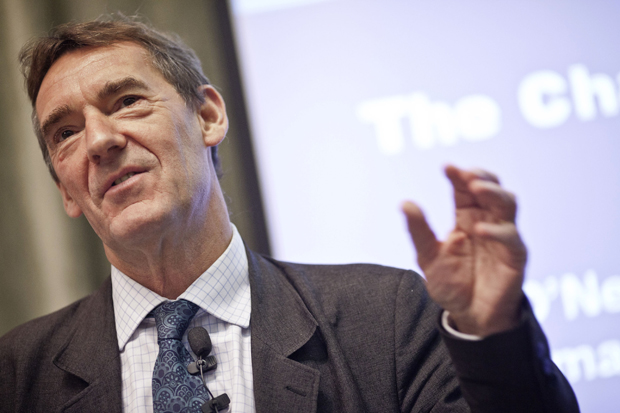A doff of my flat cap to Jim O’Neill, the former Goldman Sachs economist who has been made a peer, a Treasury minister and George Osborne’s ‘Northern Powerhouse’ supremo. The metro-politan media is busy trying to find reasons why this project for improved links between northern cities plus elements of devolution is a bad idea, or has ulterior motives behind it. The Guardian, for example, reports that ‘critics of’ Manchester’s Labour leader Sir Richard Leese think he has been ‘lured’ into championing Osborne’s plan ‘by the prospect of a bigger empire’; and that while Leese and his chief executive Sir Howard Bernstein have pulled off ‘breathtaking property deals’ (there’s a damning phrase for you), that doesn’t qualify them, or whoever Greater Manchester’s first elected ‘metro mayor’ turns out to be, to run the £6 billion worth of NHS services that will come their way as part of a package infelicitously labelled ‘Devo Manc’.
The powerhouse, if seriously driven forward, will be a bold undertaking in all its aspects — worth pursuing if for no other motive than to adjust the imbalance that saw 12 net additional jobs created in cities in the south of England for every one created in cities elsewhere in the country between 2004 and 2013. It has the potential to do far more for prosperity and social harmony than a north-south high-speed rail line, at far less cost. But O’Neill’s real challenge, apart from finding a way to compress the expected decade-long planning fight for faster trains from Liverpool to Hull via Manchester and Leeds, will be to persuade those cities (plus Sheffield and York) to work wholeheartedly with each other.
Greater Manchester already provides a model, as a cohesive grouping of two cities and ten metropolitan boroughs; among other collaborations, these local authorities are joint shareholders in Manchester Airport, the powerhouse’s international gateway. But history and Pennine geography will impede wider co-operation even if journey times shrink. Speaking to a Yorkshire dinner last week, I was heckled (in a genteel way, and only by the ladies) when I said the powerhouse would clearly have to be driven from Manchester rather than Leeds. Salford-born multimillionaire O’Neill might begin by transferring his allegiance from Manchester United — where he has already given up his season ticket, his Red Knights consortium having failed to wrestle control from the Glazer family — to Leeds United, which has been through such turmoil that Wikipedia carries an entry for ‘Doing a Leeds’, defined as ‘potential dire consequences … of financial mismanagement’.
Not that I’m being disloyal to my own county. I also think O’Neill should appoint an eloquent Yorkshire-born deputy, and I don’t mean a has-been politico — put your hand down, Lord Prescott — but a powerhouse poet laureate to complement O’Neill’s technocratic role. If Huddersfield’s Simon Armitage isn’t available, my hat’s in the ring.
Unpredictable oil
In Spectator Money, enclosed with this issue, Matthew Lynn and Robin Andrews argue that there are long-term gains to be made by informed picking of energy stocks, despite the oil-price decline. But news items even since our supplement went to press a few days ago underline the changing pattern of global supply and demand that makes this such an unpredictable sector. On the supply side, at least $100 billion worth of new oil and gas investment has been stalled since prices plunged — including most of the Alberta oil sands development that Canadians once thought would make them golden sheikhs — and Goldman Sachs has identified a longer list of projects at risk, equivalent to more than 10 per cent of global demand.
Meanwhile, Saudi exports to the US have dipped below a million barrels per day as North American production, much of it from shale, has increased. With so many new projects mothballed, however, demand focus must eventually return to the turbulent Middle East, and ‘peak oil’ advocates still see oil prices one day rising far beyond previous highs. But that’s not what’s behind the recent rally from $45 a barrel to $65: the FT explains that it’s due to massive buying of oil futures by investment funds, for speculation or as a hedge against currency and bond positions. Real-world fundamentals still point one way: ‘It’s more likely that the Brent price could fall back into the mid-$50 range than that it will continue to rise toward $70 per barrel,’ said Oilprice.com on Monday.
Agent Len at it again
You remember my theory that Unite leader ‘Red Len’ McCluskey is ‘the Conservative party’s best agent’? This is the man who as a young union official in Liverpool boosted support for Margaret Thatcher by backing Derek Hatton’s loony-left council; who instigated the British Airways strike that tainted Labour’s prospects ahead of the 2010 election; who when the coalition was in low water in 2012 reminded the nation what the alternative might have been by declaring the London Olympics a ‘legitimate target’ for protest against public-sector cuts; and whose Unite team brought hubris on Scottish Labour in 2013 by trying to shoehorn their preferred candidate into Falkirk — which went SNP with a majority of almost 20,000.
Having anointed Ed Miliband with a huge Unite vote in 2010, Len must have felt there was little more he needed to do to help his secret Tory minders to victory; he certainly kept quiet during the campaign. But now he’s offering a new masterclass in subversion by praising Andy Burnham’s candidacy to follow Miliband and hinting (though of course also denying) that he might take Unite’s millions away from Labour if the ‘correct leader’ does not emerge. Burnham might as well have ‘Len’s Man’ tattooed on his forehead, because if he wins, that’s how David Cameron will address him at PMQs week after week. As for Len himself, surely an earldom awaits.
Got something to add? Join the discussion and comment below.
Get 10 issues for just $10
Subscribe to The Spectator Australia today for the next 10 magazine issues, plus full online access, for just $10.
Join Martin Vander Weyer on the Spectator cruise. For details new.spectator.co.uk/cruise
You might disagree with half of it, but you’ll enjoy reading all of it. Try your first month for free, then just $2 a week for the remainder of your first year.















Comments
Don't miss out
Join the conversation with other Spectator Australia readers. Subscribe to leave a comment.
SUBSCRIBEAlready a subscriber? Log in